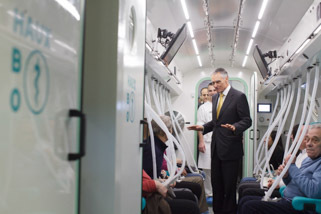
Honourable Minister of State attached to the Prime Minister
Honourable President of the International Statistics Institute,
Professor Niels Keiding,
Honourable Conference Chairman, Professor Paulo Gomes,
Honourable President of the National Statistics Institute, Dr. Alda Carvalho
I was very pleased to interrupt my holidays to address a word of welcome to you all and, particularly, to those delegates from other countries who are visiting us.
I am certain that this 56th Session of the International Statistical Institute will be an event of the greatest scientific quality, in line with its long history, with the merits of its participants, and with the efforts which have been placed in its organization. The adherence of nearly 3,000 delegates and participants, coming from more than 100 countries from all the continents of the world, testifies to the relevance of this biennial initiative. I wish you all a splendid stay in our country.
As a professor of economics, but also as a politician, I regard quality of information as enormously important.
Statistics are a powerful tool for the knowledge of our society, essential for taking decisions, to determine and assess strategies and even for political debate itself. For this very reason, I consider as extremely important the responsibility attached to methodological developments and to the production of data and its use, whether by official bodies, or by other analysis and research institutions.
This responsibility is more than ever greater, since we live in a world dependent on, and thirsting for, information. The global nature of our society – specifically in its economic dimension – is largely based on the prompt access to knowledge and on the credibility and relevance of the information that supports it.
One of the main objectives of the statistical community must be the rendering of quality information, covering the more diverse areas, whether thematic or geographic. Progress in this domain has been remarkable. The quality of work carried out is to-day widely recognized and the degree of dissemination, even as a consequence of technological progress, has significantly increased.
Much still remains to be done, however. I recall, for instance, within the range of the Objectives for the Development of the Millennium, the existing weaknesses as to statistical production on the quality of life in the less developed countries, and the difficulty this represents for the preparation and the assessment of development policies and for the fight against poverty.
Another great objective must be to give the highest relevance to accuracy. It is important that the production of information does not bow to convenience or to momentary trends. It is fundamental that statistical work be produced and transmitted clearly and independently. Only thus can we truly speak of contributions to knowledge.
I equally believe that the academic community in this area of knowledge has the duty to collaborate in the educational process on the importance and the role of statistical analysis, as a means to improve our understanding of the world and to query pre-conceived points of view.
Independently from its intrinsic quality, statistics are at times used for demagogical ends, and we are all aware that this can be achieved through the faking of results and the corruption of the gleaned information. The scientific community must contribute towards thwarting the improper use of statistics, whether or not intentionally.
Statistics are a basic tool for scientific advance, whether in natural or in human sciences. The test of theories and the advance of science are very much in line with the degree of sophistication and of knowledge that are provided by the Theory of Probability and by Statistics in general.
As an economist myself, I cannot but note that many Nobel laureates in Economics were awarded this prize for their contributions to econometrics, and for the advances that, through this, were generated in other scientific areas.
Examples such as Haavelmo, Heckman and McFadden, Engle, Granger and Prescott well illustrate what I have just said. The fact that many of these names were recent laureates shows, in turn, the growing relevance of accurate statistical methodology for the advance of economic science. I anyway believe that the same is equally applicable to practically all areas of knowledge.
This Conference will surely witness much theoretical and technical discussion. The development of robust theoretical and methodological bases is, naturally, fundamental for the progress of the quality and accuracy in the information produced. I anyway believe that scientific debate must not forget the ever greater relevance of the role that statistics accomplish in the social, political and economic context.
Depending from the formulation and correct use of statistics are decisions which affect people’s lives – both current and future –, the credibility of the institutions and the capacity to adequately supervise the performance of those that decide and govern. I am certain that the statistical community is well aware of the impact of their work and how much it can contribute towards such objectives.
Portugal progressed much in the last few years in respect of production and quality of statistics. The work that researchers have carried out and the technical efforts implemented, in institutions such as the Portuguese National Institute of Statistics, in order to ensure clearer, credible and independent information, has been remarkable. This type of work must proceed in depth, both in Portugal as in other countries.
It is an honour, as a user, to attend this Session of the International Statistical Institute. I wish that your work is fruitful and, to the many who have come from other countries that you depart with good memories of Lisbon and of Portugal.
.
© 2006-2016 Presidency of the Portuguese Republic
You have gained access to the records of the Official Site of the Presidency of the Republic from 9 March 2006 to 9 March 2016.
The contents available here were entered in the site during the 10 year period covering the two mandates of President of the Republic Aníbal Cavaco Silva.